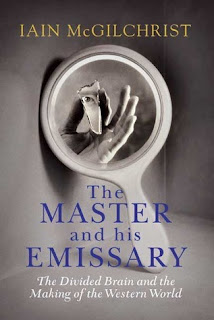Books+ Fall 2023
I haven't made time to work on my personal writing or to blog about anything for most of this year. All of my creative energy is going to my work for now. But I have continued to read. Specifically, I've kept up my New Year's resolution to read more poetry; it's one of the best decisions I've made this year. I also understand better why the unexpected turn of a poem has been so reparative and quieting now that I've read the book I'm profiling below. If you are a family member, expect to receive it as your Christmas present.
The Master and His Emissary: The Divided Brain and the Making of the Western World by Iaian McGilchrist
I first heard about this book when I stumbled on a podcast interview with McGilchrist. If you don't have roughly 30 hours to spend reading the book, you too can search for one of the many interviews of McGilchrist and get a taste of his basic argument; he also published a series of shorter essays distilling his thoughts.
But I hope you do make time to take in the whole tome because it's the most fascinating non-fiction book I've ever read (witness: my kids and husband could use a break from me talking about "the brain book"). Even if you disagree with McGilchrist's claims, you will be captivated by the scientific insights into how the human brain--and humans in general--works. You'll also have to admire the way McGilchrist weaves together so many disciplines, including poetry, music, art, clinical psychology, and science. That said, the book does start slowly; you can probably thumb through the first couple of hours. Once McGilchrist hits the meat of his exposition, though, it's worth shifting back into close reading mode.
McGilchrist's basic argument is a warning that we have drifted out of balance, toward a left-brain-dominated view of the world, and that we need to rebalance the Western world by re-embracing the right-brain view of the world in addition to the left. The right brain is the master of his title, and the left, the emissary.
This argument without context can sound like pseudoscience clickbait or the spittle of an old man left behind by modern life. But McGilchrist’s full set of claims resonates deeply with what I see in the world. I spent the summer working abroad in Europe and Scandinavia; I spent my mornings sightseeing with my family before the United States woke up, and the rest of the day and night working. It was restorative to be out of the U.S. for a while, but there was a sense of listlessness and a growing lack of purpose among people on the street, just as there is here in San Francisco. It's palpable. We lack both continuity with a grounding past and a direction toward a promising future. Instead, to varying degrees, I see young men stuck in an airless void of nothingness, atomized older men roaming the world looking for gravity, and too many young women intent on sanitizing/erasing themselves into a palatable avatar. Everywhere. I frequently worry that the solution we're barreling toward is massive violence. After all, war would solve the problem. But at the worst possible cost.
So, yes, McGilchrist's argument felt timely to me. What he writes is relevant to everything from the way I interact with the world to the relationship troubles I see around me to how children learn to read and write to the rising rates of teen depression to the growing failure to launch of young people to the existential debate about AI to the covid responses, and far, far more. (Because, yes, our brains impact absolutely everything.) In my lighter turns of mind, I imagine a novel about a world in which the fae and AI are at war: The Matrix meets Jonathan Strange & Mr Norrell. That would probably encapsulate roughly what McGilchrist is trying to lay out.
I don't have the scientific background to parse whether McGilchrist's claims about the science of the brain are true. I'm guessing there are corrections or nuances to be had, and perhaps even egregious errors, as with most scientific arguments. The two critiques I do feel comfortable making are that McGilchrist was breezy in his discussion of the material concerns of the French Revolution. He got carried away with his theory and did not marry it to the harsh, tangible complexities of that moment; the choice didn't serve his argument well. In addition, McGilchrist never lays out what a right-brain-dominated society looks like. He takes the time to lay out the future that is shaped by the left brain's disposition--the chilling path he says we're on and his reason for writing this book--but his argument would have been stronger if he'd done the same for the right brain, this other extreme.
Lest you think this is an easy extrapolation, keep in mind that McGilchrist makes it clear elsewhere in the book that the perspectives of the left and right hemispheres are not simple poles. They're not opposites. And though he makes a strong case for the primacy of the right hemisphere, I can't intuit or deduce the complex nuances of what a right-brain-dominated disposition to society would look like on the ground. Has this happened in Western history? If so, he doesn't tell us. Yet, if he wants us to walk toward the balanced middle, he would do well to locate the danger zones on all sides.
Perhaps on a podcast, Iain?
--

